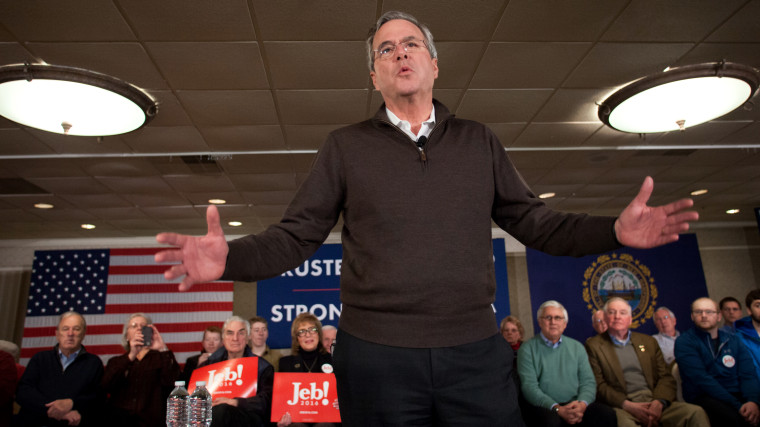Ordinarily, criticisms of the Supreme Court's Citizens United ruling come from progressive critics concerned about the role of money in politics. Both Hillary Clinton and Bernie Sanders, for example, have condemned the current system, which they believe was made worse by the 2010 court decision.
It came as something of a surprise, then, when Jeb Bush, on the campaign trail in New Hampshire yesterday, had some unkind words for the Citizens United ruling. MSNBC's Benjy Sarlin reported:
Jeb Bush turned heads on Monday when he issued a call for a constitutional amendment to undo the Supreme Court's 2010 Citizens United decision, which opened the floodgates to unlimited money groups like the pro-Bush powerhouse Right to Rise. However, his campaign quickly clarified that Bush was only reiterating an existing position, creating confusion over the remarks. "The ideal situation would be to overturn the Supreme Court ruling that allows for ... unregulated money for the independent and regulated for the campaign," Bush said at a town hall in Nashua. "I would turn that on its head if I could."
The details matter, because while Bush's criticisms of Citizens United may have initially seemed encouraging to reform advocates, the Florida Republican envisions a system that reformers probably wouldn't like at all.
On the surface, the fact that Bush has a problem with the post-Citizens United world is unexpected. The Supreme Court's controversial ruling opened the door to super PACs, and no national candidate has had more success exploiting this campaign-finance dynamic than Jeb and his allies. The Right to Rise super PAC has been extraordinarily prolific in his fundraising, reportedly raising over $117 million last year in support of Bush's candidacy.
But it's the policy just below the surface that matters.
For those who may need a refresher, super PACs can raise unlimited amounts of money from practically anyone, including corporations, but one limit remains: those super PACs cannot coordinate with the campaigns themselves.
Under Bush's preferred approach, super PACs would be unnecessary -- because individual candidates would be able to receive unlimited contributions themselves. Why have some billionaires write eight-figure checks to a super PAC when they can simply hand the money to their candidate of choice directly?
Of course, if that seems like a recipe for brazen corruption -- limits on donations were created for a reason -- Bush's plan would also include a disclosure requirement: candidates would have to "disclose their donors within 48 hours" of receiving the money.
Bush supports this change so strongly, he voiced support yesterday for possibly amending the U.S. Constitution. Again, this may seem to bring the former governor in line with candidates like Hillary Clinton, who has also raised the possibility of a constitutional amendment to address campaign financing, but the similarities are fleeting.
When reform proponents on the left talk about an amendment, their goal is to curtail the influence of money in the system. But under Jeb's plan, nearly anyone would be able to give any amount to any U.S. candidate, which is effectively the opposite of what critics of the status quo want.
